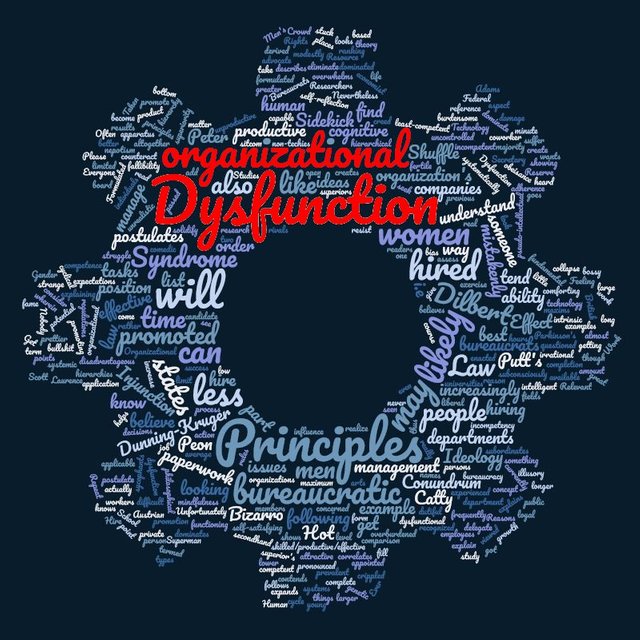10 Reasons for Organizational Dysfunction

The following list helps explain how organizations become increasingly dysfunctional over time. The maxims below are applicable in both private and public hierarchies. The larger the hierarchy or bureaucracy, the more prevalent and pronounced these issues will likely be.
Points 1-5 are widely known, while points 6-10 are derived from things I have read, heard or experienced:
1. The Dunning-Kruger Effect: The Dunning-Kruger Effect is "a cognitive bias, wherein persons of low ability suffer from illusory superiority when they mistakenly assess their cognitive ability as greater than it is." Everyone knows one - the person who mistakenly believes they are more intelligent than they really are and are bossy about getting their ideas enacted (because they believe they have the best ideas).
2. The Dilbert Principle: Formulated by Scott Adams of Dilbert fame, the Dilbert Principle contends "that companies tend to systematically promote their least-competent employees to management in order to limit the amount of damage they are capable of doing." Get passed over for a promotion your less competent coworker got? This may be why. In a strange way, it is almost comforting to know you can actually do your job...
3. The Peter Principle: A management theory concept formulated by Laurence J. Peter which postulates workers are promoted to their maximum level of incompetency, at which point they are recognized as incompetent and are no longer promoted. Ever see someone who was great at their previous position and was promoted only to struggle and get stuck there? This may be the reason why.
4. Putt's Law: Relevant in technology fields, Putt's Law states "Technology is dominated by two types of people: those who understand what they do not manage and those who manage what they do not understand." This law is fundamental to the comedic British sitcom The IT Crowd. Unfortunately, in real life it frequently results in unrealistic expectations by non-techies (like me!).
5. Parkinson's Law: This law states that "Work expands so as to fill the time available for its completion" but it has also come to be a reference to the "self-satisfying uncontrolled growth of the bureaucratic apparatus in an organization." This explains why 5 minute bureaucratic tasks can take 40 hours to complete.
6. The Catty Conundrum i.e. "Too Hot to Hire Syndrome": The Catty Conundrum is based on research showing that women are less likely to hire women they consider prettier than themselves. Researchers postulate this is because fertile women (subconsciously seek to eliminate potential genetic rivals and young women tend to dominate Human Resource departments and thus hiring decisions at large companies. The same study also shows that better looking men are more likely to be hired than average looking men. Of course there is also something that could be termed "Hot Secretary Syndrome" where men hire attractive women for their looks rather than their competence.
7. The Bizarro Principle i.e. "Nobody wants to work with Superman": The Bizarro Principle postulates that a majority of people in an organization will resist hiring or promoting someone more productive or effective than they are, even though it would increase the organization's success, so that won't look less productive or effective in comparison.
8. The Sidekick Syndrome: The Sidekick Principle states that loyal sycophants will be hired in order to solidify a superior's position or influence in an organization over a more skilled/productive/effective candidate who is less likely to exercise dutiful obeisance. Often correlates with the Ideology Injunction.
9. The Ideology Injunction: When people are hired for philosophical adherence to the organization's creed that is to never be questioned, no matter how irrational or disadvantageous it may be in real-world application. You will never find an Austrian School economist appointed to the board of the Federal Reserve, nor will you find a Men's Rights advocate hired in a Gender Studies department for example. This is a form of pseudo-intellectual nepotism that currently dominates liberal arts departments at universities.
10. The Peon Shuffle. The Peon Shuffle is a term that describes a cyclical process that places increasingly burdensome bureaucratic tasks on subordinate (non-bureaucratic, i.e. productive) members of a hierarchical organization. The cycle is as follows 1. Bureaucrats create rules, regulations and paperwork, which overwhelm them over time. 2. Feeling burdened, bureaucrats delegate the paperwork aspect to subordinates. 3. The bureaucrats realize they have little to do and are concerned they may be viewed as unproductive by their superiors. Repeat steps 1-3 until the functioning organization is crippled by bureaucratic bullshit and creates systemic collapse from the bottom up.
Taken altogether, this list goes a long way to explaining organizational dysfunction. It is difficult to know how best to counteract these issues as they are all products of human fallibility, which is an intrinsic part of all human systems. Nevertheless, I would like to believe they can be limited by mindfulness and self-reflection on the part of individuals.
So, let's open this up and get some (hopefully humorous) examples from my readers. Which of the points above have you seen in action and can you give us an example? Please, no names!
Cheers,
Cupid Zero

References:
Relevant articles on Wikipedia
http://www.dailymail.co.uk/news/article-1335283/Good-looking-women-likely-turned-job-jealous-HR-staff.html
Real life
The Dunning-Kruger Effect is the one I've encountered. Unfortunately, not only at work :D
Good and interesting article... Upvoted and Resteemed! :)
Downvoting a post can decrease pending rewards and make it less visible. Common reasons:
Submit
There is the flip-side of the Dunning-Kruger Effect as well, where someone who really is very smart just assumes everyone else can understand what they do. I see both sides of the DK Effect in the education field a lot. Thanks for the upvote and resteem!
Downvoting a post can decrease pending rewards and make it less visible. Common reasons:
Submit
I've encountered that,too. And you're right. Education field is the main domain of it :)
You're welcome :)
Downvoting a post can decrease pending rewards and make it less visible. Common reasons:
Submit
Congratulations @cupidzero! You have completed some achievement on Steemit and have been rewarded with new badge(s) :
Click on any badge to view your own Board of Honnor on SteemitBoard.
For more information about SteemitBoard, click here
If you no longer want to receive notifications, reply to this comment with the word
STOPIf you want to support the SteemitBoard project, your upvote for this notification is welcome!
Downvoting a post can decrease pending rewards and make it less visible. Common reasons:
Submit